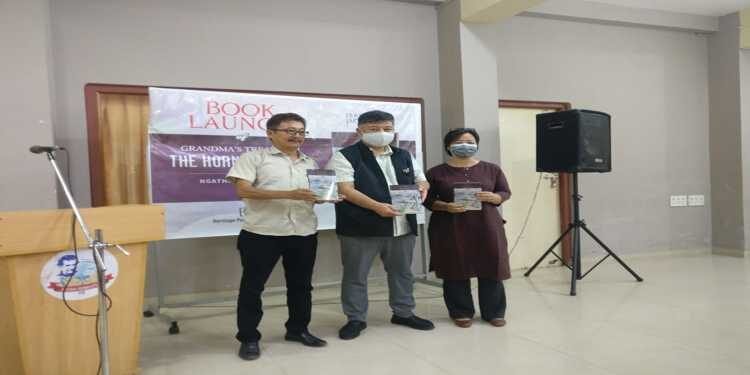By Imna Longchar
Dimapur (Nagaland) , Nov 13 : “Grandma’s Treasure-I, The Hornbill Dance”, a book authored by Ngathingkhui Jagoi, narrating on how his grandma’s bedtime stories had inspired him to start writing was released Saturday by Advisor to Nagaland Chief Minister, Abu Metha, at a solemn programme held at the DBIDL Hall, Don Bosco School, Dimapur.
The book is published by the Heritage Publishing House (HPH).
Speaking after releasing the book, Abu Metha while lauding Jagoi for experiencing hardship in documenting the “folk stories” as narrated to him by his granny, said that Naga society must be thankful to people like the author (Jagoi) for writing stories that would come stay forever, while also hoping that more Naga writers would come forward and tell the stories of “thousand of grandmas for millions of our future children” which would become “history books” of the future for which he termed this as the responsibility of the present generation.
Abu also shared that he has always encouraged public servants posted in the far-flung corners of the state to interact with the local populace, the old folks, so as to bring out the stories as according to him, the stories are important for future generations to know from where they came, their cultures and also to be proud of them.
He also said that for so long, the Nagas have been known for “wrong reasons” like “insurgency and violence”, but he felt that it is the time for Nagas to be known for “good things” including in the field of art, sports, science, education and more.
The advisor to the Nagaland chief minister also expressed his desire to learn more about the publisher of the book “Grandma’s Treasure-I, The Hornbill Dance”, its journey, struggles, and way ahead while also assuring his personal support and government intervention, if needed.
Meanwhile, speaking at the book launch programme, the author Jagoi narrated about how his grandma’s bedtime stories had inspired him to start writing which dates back to his childhood days and along the way how he struggled even though he had written so many stories but got rejected because the story had a content of Nagas forefather’s head hunting stories.
Sharing his nostalgic childhood memories in the late 60s and early 70s, he said those growing years were “sweet and remarkable” with a bedtime story which was an compulsory item for him every day, and sometimes had to “cajole” or “pester” his grandma, Late J Makatunla, to tell him stories every night despite not knowing that she is tired.
As most of the time, parents used to leave their children under the care of old folks within the neighbourhood when they go to their fields during the day, Jagoi also shared about how he used help the old womenfolk shooing away the fowls from eating the paddy which were spread on the bamboo mat for drying.
Even during the rainy days, he said the elders instead of letting the loose their “naughty boys and daughters” to play in the rain instead told stories to them by the hearth inside the house, the stories mostly based on man possessing the spirit of animals, insects and vice-versa, mythical heroes who performed great feats of valour and marrying princesses, children sold or bartered in exchange for foods, broken homes, creation and so on.
He later shared that as he grew up, he started scribbling down some “popular stories” in his own dialect, however, he found these mythical stories absurd without historical relevance and therefore, he thought it would be illogical to waste his time writing such stories.
Fortunately, an uncle of him who is a writer too suggested him that he should write stories of the “ages past” which were verbally handed down from generation to generations in the manner which the “grandmas” had narrated.
Jagoi further said that the writing was completed in the year 2006 and he had approached the National Book Trust of India (NBTI) where an agreement was signed the same year with a 12 percent royalty share, but later got rejected citing reasons that many of the stories in the book are about killings (head hunting) and gory narration and that he should remove such lines.
Disappointed, he said he told the editor that he cannot change the oral tales and history which abruptly ended the idea of the book.
However, a decade later, Jagoi said that it was in 2018 his uncle insisted him not to give up though financial condition of journalist (s) was known to everyone in the state for which he couldn’t go ahead but finally released the book after gap of three years for which he extended gratitude to those who had helped him.
Later, he also shared that in a way he consider himself to be fortunate that he could avail the opportunity to interact with those “precious old folks” including his late grandma.
“They cannot read or write, but they retold the stories to me. In that manner, I compile this book and want to retell the younger generations to come. I am indebted to all of them who had narrated the stories to me,” Jagoi said.
It may be mentioned that the stories in Ngathingkhui Jagoi’s book “Grandma’s Treasure-I, The Hornbill Dance” which he expressed his desire to make a series publications, are some collection of the Tangkhul Naga community which could also be found similar to other communities.
Meanwhile, Jagoi has extended his gratitude to Publisher, Dr. Lanusangla Tzudir, who graciously took the entire responsibility in bringing the fruition of the book besides being the publisher.
Earlier, Doctoral Scholar, Academic and book reviewer, Asenla Yanger, chaired the programme, while Pastor, Tangkul Baptist Church, Diphupar, Rev. Candid Sarei, offered the dedicatory prayer.










































